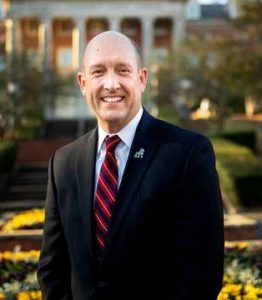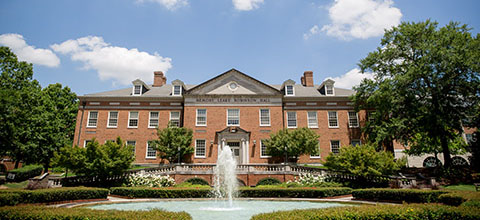Once again, Samford University has denied a request to allow a group for LGBTQ students — this time excluding students in its highly rated Cumberland School of Law.
In 2017, the Birmingham school forfeited $3 million a year in institutional funding from the Alabama Baptist State Convention in a dispute over a proposed student group dedicated to the discussion of LGBTQ issues and human sexuality. Yet after taking that stand with the state Baptist convention, then-President Andrew Westmoreland refused to approve the student group.
While the 2017 request would have created a campuswide forum for students to discuss topics related to sexual orientation and gender identity “in an open-minded and accepting environment,” the current request related only to the law school.
Because of its national prominence — ranked No. 10 in the nation in preparing trial lawyers — the law school often operates in its own sphere, according to alumni interviewed by BNG. But that independence does not extend to allowing gay and lesbian students to formally organize — part of a current hardening of the school’s anti-gay posture.
In September, BNG reported that Samford had for the first time intentionally excluded several local churches and ministries from sanctioned presence on campus — all because those churches or ministries affirm same-sex marriage. That action sparked protests by students, alumni and local clergy.
Exactly what are the parameters of Samford’s new policy is not known because the university never has published its policy and school officials have ignored multiple media requests for clarification.
Exactly what are the parameters of Samford’s new policy is not known because the university never has published its policy and school officials have ignored multiple media requests for clarification. Faculty and staff members contacted by BNG have declined to comment, citing a fear of losing their jobs if they speak.
This time, law school students sought to form a campus chapter of OUTLaw, a professional group active on many other law school campuses across the nation.
Law school student Angela Whitlock was one of the organizers of that application, according to reporting by AL.com.

Beck Taylor
Current Samford President Beck Taylor informed Whitlock Oct. 20 that the university had denied her application.
“I am ever mindful of the array of views and opinions on LGBTQ-related issues in contemporary culture, including among Samford’s students and employees,” Taylor wrote in a letter. “Civil discourse on matters of human sexuality and other subjects at the forefront of the public debate will always exist at Samford, and the university is not retreating from those discussions.
“Nevertheless, extending official university recognition to a student organization that advocates for beliefs and behaviors contrary to the religious values of Samford would be inconsistent with my responsibilities as president.”
“Extending official university recognition to a student organization that advocates for beliefs and behaviors contrary to the religious values of Samford would be inconsistent with my responsibilities as president.”
Whitlock told the Alabama news outlet Taylor told her and others in a private meeting that he feared allowing the group to exist would invite future opportunities for LGBTQ students to “advocate for a larger agenda” that the university is “simply not willing” to allow.
In his first year as Samford president, Taylor has drawn a hard line against same-sex relationships and marriage while at the same time saying LGBTQ students are welcome on campus. Like other Baptist universities, however, Samford has a history of expelling students who violate its unwritten policies against same-sex behavior.
The current version of the university’s Student Handbook makes no mention of a prohibition of same-sex relationships.
Requiring diversity and inclusion is a critical part of accreditation requirements for law schools as promulgated by the American Bar Association. The ABA’s most recent updates to its standards have been harshly criticized by some conservative groups, including the Federalist Society, for being too “woke.”
The standards as revised in 2021 state that a law school must provide “full opportunities for the study of law and entry into the profession by members of underrepresented groups, particularly those related to race, color, ethnicity, religion, national origin, gender, gender identity or expression, sexual orientation, age, disability, and military status.”
The standards also require law schools to create “an inclusive and equitable environment for students, faculty and staff.”
Whether Samford’s refusal to allow a professional group for LGBTQ law students will run afoul of these accreditation requirements is not clear.
However, the news is not sitting well with some alumni, who fear their alma mater soon will be a pariah in the legal community.
“That message is this: ‘You are not welcome here. At least not officially. But also we want your LBGTQ tuition dollars.’”
“I am saddened but not at all surprised anymore that Samford as banned OUTLaw from the law school,” said alumnus Jacob Ray, who lives in Birmingham. “As a Cumberland graduate and PCUSA Presbyterian, I am acutely aware of Samford’s recent moves to send a loud and clear message to LGBTQ students and those of us in faith communities and denominations that are affirming of them as children of God just the way they are. That message is this: ‘You are not welcome here. At least not officially. But also we want your LBGTQ tuition dollars.’”
When it comes to recruiting students who can pay private law school tuition, “it turns out gay dollars are equal to straight dollars,” Ray said.
And while law school students used to believe the religious and political restrictions of the main campus could not harm the law school, that is no longer true, he added. “Gone is the often used talking point of ‘Don’t worry. Samford lets Cumberland be Cumberland.’ It is a slippery slope. What is next for Samford’s appetite for meddling in the law school? Only King James biblical laws being taught? This will definitely hurt Cumberland’s ability to recruit a broad and diverse student body.”
Law school students who sought to launch the OUTLaw chapter at Samford issued their own letter yesterday in response to Taylor’s letter.
“If by ‘agenda’ President Taylor means that we intend to let the LGBTQ population at Samford know that they are welcomed and loved just the way they are, then by all means his accusations are well-founded,” the group said. “But in contrast to the imaginary ‘harm’ contemplated by President Taylor, the LGBTQ students at Samford’s law school — in addition to those in its undergraduate program — must now deal with the real and immediate harms posed by the anti-LGBTQ stigma which the university’s position endorses.”
Related articles:
Four years ago, a Samford study group recommended more conversation on sexuality — and got ignored
Samford students organize silent protest over LGBTQ discrimination
I’m now banned from ministering at a place I love | Opinion by Rich Havard
We are hurt by Samford’s exclusion | Opinion by Erica Cooper
100 clergy who are Samford grads urge president to reverse exclusionary policy
Samford, how long will you remain silent? | Opinion by Mark Wingfield
Samford University excludes Presbyterians and Episcopalians
Samford cancels Jon Meacham speech after ‘pro-life’ activists spark challenges
Samford forfeits Baptist funds but pulls plug on student gay-straight alliance

